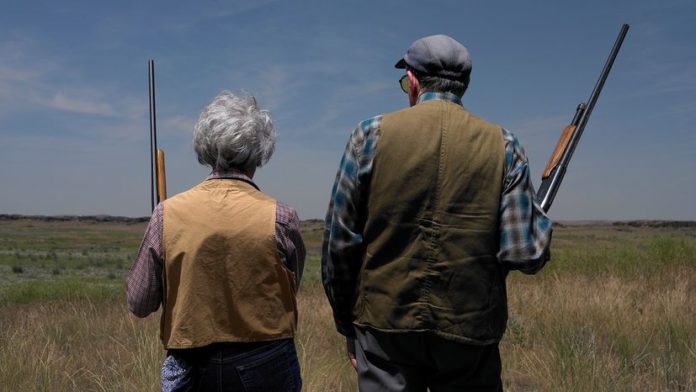 “Older Americans, in general, are more likely than other age groups to own or live with guns. Andy Reynolds/Photodisc/Getty Images
“Older Americans, in general, are more likely than other age groups to own or live with guns. Andy Reynolds/Photodisc/Getty Images
One of the absolute hardest parts of getting older is losing your independence.
Katherine Galluzzi has been practicing geriatric medicine in the Philadelphia area for more than 25 years and is often in the difficult position of telling a patient or their caregiver that it’s no longer safe to drive a car.
"We have patients on hospice who are very frail, who require round-the-clock oxygen, and are still driving down to Atlantic City," says Galluzzi, professor and chair of the department of geriatrics at the Philadelphia College of Osteopathic Medicine (PCOM). If the patient or family members disobey doctor’s orders, Galluzzi can fill out a form with the Pennsylvania Department of Motor Vehicles alerting the authorities that this person shouldn’t be behind the wheel.
"We can’t take the keys away. I can’t disable the car. But we can sound the alarm," says Galluzzi, co-author with her PCOM colleague Ilene Warner-Maron of a December 2018 journal article warning about a lesser-known public health risk — elderly dementia and guns.
The problem, Galluzzi and Warner-Maron explain, is that even though high percentages of elderly folks with cognitive impairments are gun owners, or live in homes where there is access to a firearm, there’s no simple mechanism like a DMV form that allows physicians to intervene if they feel like the weapon poses a clear danger to the person or the public at large.
"Arguably, people can do more harm with a gun than they can with a vehicle," says Galluzzi.
According to surveys cited by the authors, 60 percent of households with an individual with dementia were found to have one or more firearms. Older Americans, in general, are more likely than other age groups to own or live with guns, with 27 percent of people 65 or older owning one or more guns, and 37 percent living in a home with one or more guns.
In the Journal of the American Osteopathic Association article, the authors tell the tragic story of an 80-year-old man with Alzheimer’s and other chronic health conditions living alone in a senior citizens apartment complex and receiving daily care from the same home health aide.
"One morning, despite having known this aide for some time, the patient exhibited increased confusion and failed to recognize the aide," Galluzzi and Warner-Maron write. "He perceived her to be an intruder. She attempted to calm him but was unable to reorient him. He became increasingly agitated and, after several minutes, he retreated to his bedroom. On return to the living area, he shot and killed her."
The fear is that as baby boomers enter their mid-70s and 80s, awful stories like this aren’t going to be isolated cases.
"We have a large amount of older people who are gun owners, and a large amount of gun owners who are older and dementing," says Warner-Maron, co-director of PCOM’s master’s program in aging and long-term care administration. "This is the perfect storm that is not being addressed and it needs to be."
Asking Questions About Gun Ownership
The million-dollar question, of course, is how to address it. One option is to expand so-called "red-flag laws" to allow physicians and clinicians, not just family members and law enforcement, to petition the court for blocking a dementia patient’s access to guns. Currently, only 13 states have these extreme-risk laws on the books, but doctors aren’t included in any of them.
For Galluzzi and Warner-Maron, though, legislation isn’t the top priority. The bigger issue right now is that very few primary care doctors and other clinicians like physical therapists and clinical social workers routinely ask patients and caregivers whether there are guns in the house. Apart from being a politically thorny issue, it isn’t seen as a priority given how many other topics need to be covered in time-crunched patient interviews, including test results, health history, medications and more.
While neither of the authors want to see doctors put in the role of police, literally taking guns out of people’s hands, they both see great value in including basic questions about gun ownership during every visit with patients dealing with dementia.
"Clinicians, either rightly or wrongly, are not in the position, nor do we have the legal authority to make these determinations," says Galluzzi. "What we can do is raise awareness, and engage with families and community agencies that can help us affect change — to protect not only the patient, but everyone around the patient."
What if It’s Your Family Member?
The Alzheimer’s Association has its own recommendations for families of gun owners who have the disease. While locking up weapons and ammunition separately is a basic tenet of gun safety, the organization says that such measures might not be enough to prevent tragic accidents. Instead, it recommends getting the gun out of the home before the patient’s decision-making skills are dangerously compromised. Suggestions include an "early inheritance" that gifts the firearm to a trusted family member or donating it to a firearms organization or historical society.
Doctors and other clinicians can support families in this process by including routine questions about gun ownership similar to the mental health screening tools currently part of most annual physicals. Galluzzi and Warner-Maron came up with a proposed clinician’s checklist that includes questions about gun safety and calls out "red flags" including cognitive impairment, psychiatric illness and post-traumatic stress disorder.
"What we’re proposing is first of all awareness, second education, and lastly putting these kinds of mechanisms in place so it’s more normalized," says Galluzzi. "It becomes an expectation that we ask."
Now That’s a Relief
The controversial "Docs v. Glocks" law in Florida, which explicitly forbade physicians from asking patients about gun ownership or gun safety, was struck down in 2017.










































